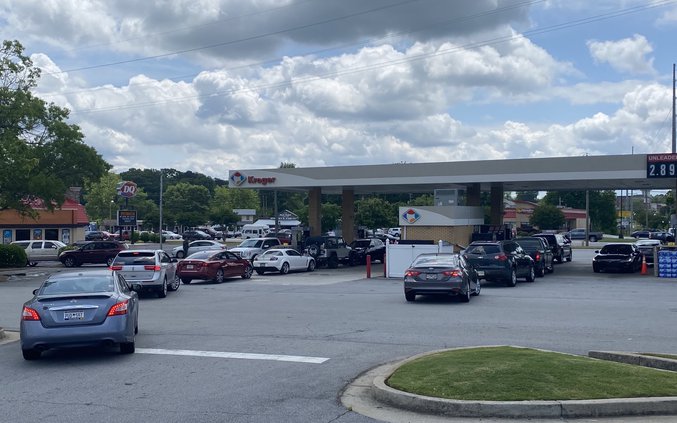COVINGTON, Ga. — Recent shortages have not stopped some area businesses heavily reliant on steady gasoline supplies from getting their products to their customers.
Both, however, have taken measures to make sure their vehicles do not end up on the side of the road.
A ransomware attack on Colonial Pipeline’s computer systems last weekend prompted the Alpharetta-based company to shut down its 5,500-mile pipeline that supplies 47% of the gasoline to the East Coast.
Colonial reported today it had resumed moving normal supplies through the part of its pipeline that runs through Georgia but service will not be fully restored for several days.
Wayne Harper, owner of D&W Air Flow in Covington, said he has been forced to limit his company's service calls to about a 25-mile radius of Covington out of fears technicians would be unable to find gas in time to make it back to its Brown Bridge Road office.
Harper said his company normally services customers throughout Metro Atlanta; as far south as Newnan and Milledgeville; and as far east as Lake Oconee.
“We’ve kind of limited that the past couple of days — where we’re going,” he said.
D&W is a 35-year-old company that repairs, maintains and installs heating and air conditioning units.
He said the company had filled up its fleet of five vehicles with gas Monday before lines started forming Tuesday and Wednesday and dried up supplies at a majority of gas stations in the area.
“We had to scramble around getting $15 here and $15 there (of gas) because a lot of them had a $15, $20 limit on it,” he said. “We’re just spinning our wheels trying to make things happen.”
He said D&W has had to delay some work it normally does around this time each year fulfilling contracts for biannual maintenance on HVAC units.
However, he said the limited fuel supply has not reduced other demands for the company’s services.
“We’re still maintaining at full speed,” Harper said. “But when it’s like this you’ve got to improvise and do things a little different than you normally do.”
Alanna Harris, manager of Domino’s Pizza on U.S. Hwy. 278 in Covington, said her delivery drivers have been able to find gas and not forced her to turn away customers.
“A couple of stores in our district have had to send people home because they didn’t have gas and there was nowhere to find it,” she said.
Harris said she is telling her delivery drivers to use apps on their phones that locate stations with gasoline.
The company also temporarily increased its pay to delivery drivers by $2 to compensate for higher gas prices this week, Harris said.
Gov. Brian Kemp signed an executive order Tuesday that suspended collection of the state gasoline tax and lifted typical weight limits on trucks hauling fuel.
The U.S. Environmental Protection Agency also approved the state’s request to allow the sale of a blend of gasoline normally sold only during winter months that the state has in storage.
And state Attorney General Chris Carr said his office had received more than 300 complaints of price gouging.
The Better Business Bureau said in a news release it was urging anyone suspecting a store is price gouging gasoline to report it to the Bureau or the state attorney general’s office.
The BBB urged those reporting a price-gouging complaint to gather as much information and follow three suggested actions:
• Be as specific about the transaction as possible, including the name and address of the business, names of any employees involved, and information detailing the spike in pricing.
• Gather documentation supporting the price gouging — such as receipts, photos of products and their advertised pricing, and invoices.
• Compare pricing of similar products with other sellers in the area as well as online. “Again, it’s important to note similarities and differences between brands, size (and) quantity, manufacturers, model numbers and prices,” the release stated. “The Georgia Attorney General’s office will need that information to conduct a thorough investigation.”
Those seeing a likely violation can call 404-651-8600 to report it, the release stated.
The Bureau also warned businesses “to avoid the temptation to raise prices during a crisis because it erodes marketplace trust.”
“Consumers will remember which businesses took advantage of them,” a news release stated.





